中职英语(基础模块)1生活与文化原文及翻译
中职高教版英语1基础模块

a personal name cardanddescribetheoccupationof others.
教学内容题 目
职业岗位知识点、能力点
与基本职业素质点
目标水平
识记
理解
熟练操作
应用
分析
Readingand Writing
知识点:Masterthegrammar structure Verb“be”pronouns.
【主要教学内容】
Content:
the words about name card and vocation.eg:telephone number; age; address; e-mail address; job (engineer; manager; secretary; teacher; student; doctor; nurse; singer; fans); position(boss)
2)about greeting:Good to meet you.
3)about personal information:What’s you name Where are you from Which company are you from
designpersonalname card.
【主要能力点与知识点应达到的目标水平】
the meaning of“last name”and“first name”.
9. Read and underline. Practice the dialogue with your partner and underline the sentences aboutasking one’s personal information.
中职英语 基础模块1 Unit 1 Personal and Family Life
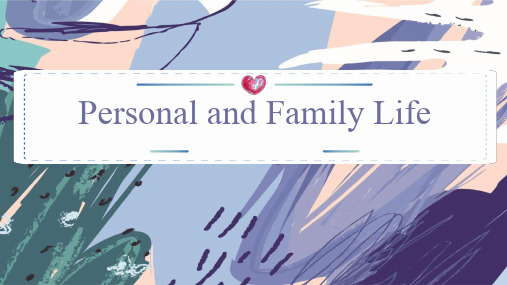
重点详解
1. family name given name Liu Xingting is a flight attendant.
Xinting is her given name. Xu Ming is a firefighter. Xu is his family name.
单词卡片 middle school student
younger sister
twin sisters especially
community
n.初中生 n.妹妹
n.孪生姐妹 adv.尤其是
n.社区
单词卡片 cook
Chongyang Festival handmade
family name delivery person
我的一名消防员,我的妻子是一名教师。
(2)He wants to work as a teacher in Western China. 他想在中国西部当一名教师。
重点详解
4.manage.v动词 manager.n 名词
英译汉: 1.He manages a department. 2.He is a manager.
n.厨师 重阳节 adj.手工的 n.姓 n.送货员
单词卡片 given name flight attendent firefighter vocational ancestor
n.名 n.空乘人员 n. 消防员 adj.职业的
n.祖先
单词卡片 address formal
situation
as for name after
little
三、选择题。
中职英语 基础模块1 Unit 1 Personal and Family Life
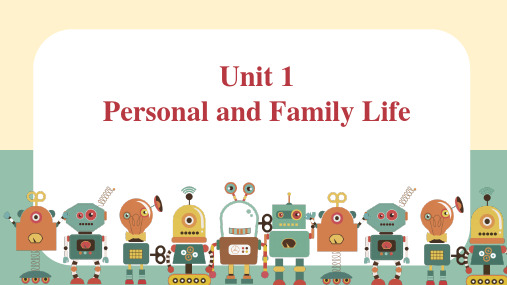
work as a teacher in Star Vocational(职
业的) High School.
记一记:记记交际语
交际语: Hello!My name is ...... . I'm...... . 你好!我的名字是.... 我是...(职业) Hi! My name is ...... . My family name is..... . 你好!我叫....。我姓.....。 Nice to meet you! My first name is... 很高兴见到你!我的名字是....。 Good morning/afternoon/evening! 早安!/午安! / 晚安! How do you do! 你好! I work as.... 我的工作是....
Smith Brown Brown
given name
first name (名字)
family name
last name (姓)
中国是姓在前名在后 西方是名在前姓在后
找一找:找出打招呼的英文表达
1. Hello! my name is Li Ting. I'm a
doctor. my family name is Li.
Words game
点击每个礼物,说出相应单词和释义
doctor
firefighter
delivery person
flight attendant
teacher
1. think and match. 将以下自我介绍与图中人物相匹配
52 3 4 1
1. Hello! my name is Li Ting. I'm a doctor. my family name is Li. 2. Hi! My name is Zhang Yifan. I'm a delivery person. Yi fan is my given name. 3. Nice to meet you! I'm Liu xinting. I'm a flight attendant. How can I help you? 4. Good morning!I'm Xu Ming, a firefighter. My given name is Ming means brightness. 5. Good afternoon! I'm Yu xinling. I work as a teacher in Star Vocational High School.
中职英语基础模块1期末复习课文翻译6—10单元
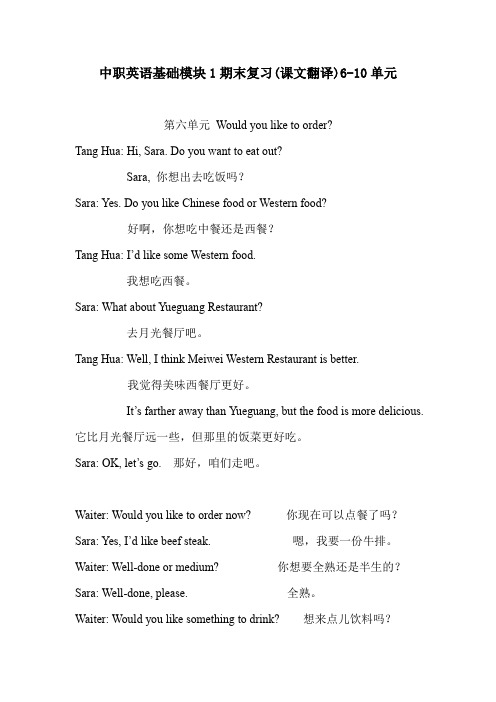
中职英语基础模块1期末复习(课文翻译)6-10单元第六单元Would you like to order?Tang Hua: Hi, Sara. Do you want to eat out?Sara, 你想出去吃饭吗?Sara: Yes. Do you like Chinese food or Western food?好啊,你想吃中餐还是西餐?Tang Hua: I’d like some Western food.我想吃西餐。
Sara: What about Y ueguang Restaurant?去月光餐厅吧。
Tang Hua: Well, I think Meiwei Western Restaurant is better.我觉得美味西餐厅更好。
It’s farther away than Yueguang, but the food is more delicious. 它比月光餐厅远一些,但那里的饭菜更好吃。
Sara: OK, let’s go.那好,咱们走吧。
Waiter: Would you like to order now? 你现在可以点餐了吗?Sara: Yes, I’d like beef steak.嗯,我要一份牛排。
Waiter: Well-done or medium? 你想要全熟还是半生的?Sara: Well-done, please. 全熟。
Waiter: Would you like something to drink? 想来点儿饮料吗?Sara: A glass of orange juice, please. 请给我来一杯橙汁。
Waiter: Beef steak well-done and a glass of orange juice.全熟的牛排和一杯橙汁,对吗?Sara: Right. 是的。
Waiter: What about you, Miss? 小姐,您呢?Tang Hua: The same, please. 和她点的一样。
中职英语基础模块上册unit1(完整版)

a pat on the back
a hug
拥抱:在欧美、中东及南美洲常见的礼节, 一般用于熟人和朋友之间,有时伴随着接吻礼, 是比较亲密的一种见面礼仪。这种礼仪一般用 于同性或者亲密的异性之间。
1.w_______ (欢迎) 2. v _______ (职业的) 3. g_______ (高兴的) 4. m________(遇见,汇合,迎接) 5. l______(看,瞧,看起来,显得... ) 6. c______ (教室) 7. b________ (建筑物,楼房) 8. l________ (实验室) 9. f_____(楼层,地板) 10. l________ (大的) 11. b_______ (明亮的) 12. c__(班级,课节)
❖every
❖ adj. 每一个;每个
❖love
❖ v.热爱;爱好
❖hard
❖ adv.努力地;adj.硬的;难的
❖thank
❖ v./n.感谢
thank …for… 为…而感谢…
例句:谢谢你的帮助。eg. Thank you for your help.
❖visit ❖time ❖English ❖want ❖desk ❖chair
a bow
鞠躬:日本是一个极其注重礼节的国家,见面时一般 都要互相问候,脱帽鞠躬,眼睛向下,表示诚恳的态度。 日本妇女温柔体贴,每天鞠躬无数次,对男子亦十分尊 重。除了日本之外,朝鲜人见面也行鞠躬礼。
a kiss on the cheek
接吻礼:接吻礼是西欧流行在亲人、朋友、夫妻之间的 亲昵礼节,一般只能在受礼者脸颊上轻吻一下,不能发出声 音。感情激烈时,比如说遇到喜事或丧事,也可以使用接吻 礼,表示兴奋或者安慰、同情。
高教版中职英语(基础模块 第1册)
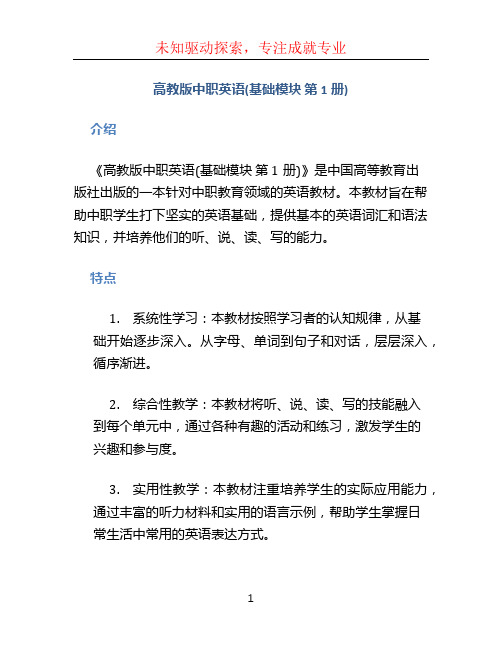
高教版中职英语(基础模块第1册)介绍《高教版中职英语(基础模块第1册)》是中国高等教育出版社出版的一本针对中职教育领域的英语教材。
本教材旨在帮助中职学生打下坚实的英语基础,提供基本的英语词汇和语法知识,并培养他们的听、说、读、写的能力。
特点1.系统性学习:本教材按照学习者的认知规律,从基础开始逐步深入。
从字母、单词到句子和对话,层层深入,循序渐进。
2.综合性教学:本教材将听、说、读、写的技能融入到每个单元中,通过各种有趣的活动和练习,激发学生的兴趣和参与度。
3.实用性教学:本教材注重培养学生的实际应用能力,通过丰富的听力材料和实用的语言示例,帮助学生掌握日常生活中常用的英语表达方式。
内容概述本教材共分为8个单元,每个单元涵盖以下内容:单元1:字母与发音•学习英语26个字母及其发音规则•练习正确发音•分辨字母大小写单元2:数字与数量•学习基本数字及其用法•表达时间、年龄、日期等数量单元3:个人信息•学习表达个人信息,如姓名、年龄、国籍等•掌握常见的形容词和人称代词单元4:问候与介绍•学习日常问候语和自我介绍的方式•了解常用的礼貌用语和相互之间的称谓… …单元8:购物与交流•学习购物时常用的词汇和句型•培养通过交流解决问题的能力学习方法针对中职学生的特点,本教材提供了一些学习方法和技巧,帮助学生更有效地掌握英语知识:1.多听多说:通过听录音和模仿说话,提高听力和口语表达能力。
2.多读多写:通过大量阅读和写作练习,培养阅读理解和写作能力。
3.积极参与:利用课堂活动和小组讨论,积极参与课堂学习,提高学生的合作和沟通能力。
4.多用多练:通过大量的练习题和口语对话,巩固和应用所学的知识,加深理解。
结语《高教版中职英语(基础模块第1册)》是一本专门为中职学生准备的英语教材,旨在帮助他们打下坚实的英语基础。
通过系统性的学习和实用性的教学方法,学生将能够掌握基本的英语词汇和语法知识,并能够流畅运用在日常生活中。
希望这本教材能为中职学生的英语学习提供有力的支持。
中职英语基础模块1 school life

中职英语基础模块1 school life中职英语基础模块1 School LifeIn this article, we will explore the topic of "中职英语基础模块1 School Life" in depth, providing a step-by-step analysis and answering any relevant questions along the way.1. What is the meaning of "中职"?"中职" refers to a category of education in China called "中等职业教育" (zh ōng děng zhíyèjiàoyù), which can be translated as "secondary vocational education." It is a type of education that focuses on equipping students with practical skills to prepare them for specific vocations or careers.2. What is the significance of studying English in a vocational school?Studying English in a vocational school is of great significance as it helps students to broaden their horizons, communicate effectively with people from different cultural backgrounds, and enhance their job prospects. English has become a global language, and proficiency in English is increasingly valued by employers, both in China and internationally.3. What is "基础模块1" (Basic Module 1) in 中职英语?"基础模块1" (Basic Module 1) in 中职英语refers to the first module of English language learning in a vocational school. It is designed to provide students with a solid foundation in English, covering essential topics such as greetings, introductions, expressing feelings, discussing daily routines, and more. This module focuses on developing basic communication skills that are necessary in everyday life.4. What are some key topics covered in "基础模块1" (Basic Module 1)?In "基础模块1" (Basic Module 1), students will study topics such as personal information, family, friends, school life, hobbies, and occupations. They will learn basic vocabulary and sentence structures related to these topics, and practice speaking, reading, writing, and listening skills through various activities and exercises.5. How are the materials and resources for "基础模块1" (Basic Module 1) structured?The materials and resources for "基础模块1" (Basic Module 1) aretypically structured in a progressive manner. They begin with simple and concrete topics, gradually moving towards more abstract and complex ones. Learning materials may include textbooks, workbooks, audio recordings, visual aids, and online resources. These resources aim to provide a comprehensive learning experience and cater to different learning styles.6. What teaching methods are commonly used in "基础模块1" (Basic Module 1)?Various teaching methods are employed in "基础模块1" (Basic Module 1) to ensure effective learning. These may include lectures, discussions, group activities, pair work, role-plays, language games, and multimedia presentations. Teachers often incorporate a communicative approach, where students are encouraged to actively participate and interact in the target language.7. What are the assessment methods in "基础模块1" (Basic Module 1)?Assessment methods in "基础模块1" (Basic Module 1) typically include quizzes, tests, oral presentations, group projects, and written assignments. These assessments aim to evaluate students'comprehension, language skills, and overall performance. They provide feedback to both students and teachers, indicating areas that need improvement and areas where students excel.8. How can students make the most of "基础模块1" (Basic Module 1)?To make the most of "基础模块1" (Basic Module 1), students should actively engage in the learning process. They can participate in class discussions, practice speaking with classmates or language partners, review vocabulary and grammar regularly, and seek help from teachers when needed. Additionally, utilizing supplementary resources such as online language-learning platforms, language apps, and language exchange activities can further enhance their language proficiency.In conclusion, "中职英语基础模块1 School Life" is a critical part of vocational education in China. It equips students with practical English skills, helping them to navigate their academic and professional lives more effectively. By understanding the significance, key topics, materials, teaching methods, assessment methods, and strategies for success in "基础模块1," students can maximize their learning experience and gain proficiency in English.。
中职英语基础模块3 第一单元重点单词Unit 1 He decided to have a big Christmas party.

中职英语基础模块3 第一单元重点单词Unit 1 He decided to have a big Christmas party.一、预习:生活和文化(教材P21)Thanksgiving感恩节1.带着问题阅读文章,并找出答案回答问题。
关键词已经用双横线画出来。
原文的生词:ever since: 从此start: 开始common:共同的,常见的with: 和sport: 体育运动match:比赛people:人们,人民①When did Thanksgiving Day start?②How was the first Thanksgiving Day celebrated?③Who did people thank on the first Thanksgi v in g Day?④Who do people thank for now on Thanksgiving Day?⑤What is the most common food for Thanksgiving Day?⑥Whom do people celebrate Thanksgiving Day with?Lead-in 导入(教材P9)1.匹配题。
将图片和相应的句子描述匹配。
重点词汇:★home / house / family 有什么区别?1.family“家庭,家庭成员”(与居住的房子无关)当family为“家庭”时,为单数;→My family is happy.当family为“家庭成员”时,为复数。
→My family are watching TV.2.house “房屋,住宅”(一般对家人所居住的建筑物而言。
)→There are many new houses in our village.(我们村里有很多新房子。
)3.home “家”(一个人出生或居住的地方),“家乡,故乡”house 没有感情色彩;home 有感情色彩,暗含“团聚,思念”的意思。
中职英语基础模块1 school life
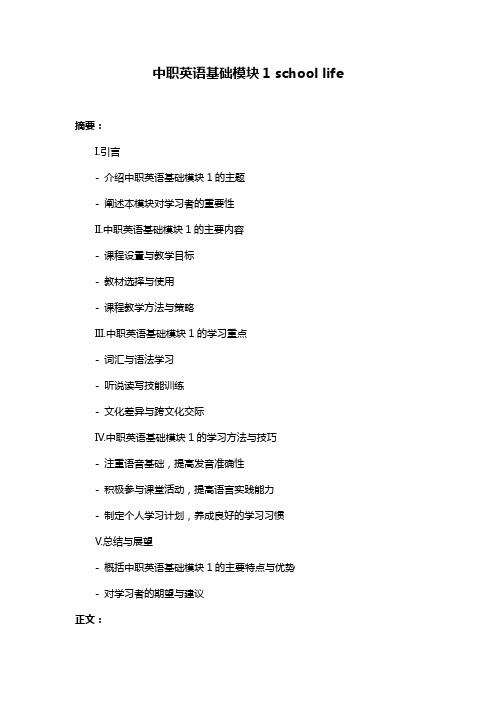
中职英语基础模块1 school life摘要:I.引言- 介绍中职英语基础模块1的主题- 阐述本模块对学习者的重要性II.中职英语基础模块1的主要内容- 课程设置与教学目标- 教材选择与使用- 课程教学方法与策略III.中职英语基础模块1的学习重点- 词汇与语法学习- 听说读写技能训练- 文化差异与跨文化交际IV.中职英语基础模块1的学习方法与技巧- 注重语音基础,提高发音准确性- 积极参与课堂活动,提高语言实践能力- 制定个人学习计划,养成良好的学习习惯V.总结与展望- 概括中职英语基础模块1的主要特点与优势- 对学习者的期望与建议正文:中职英语基础模块1是专为中职学生设计的一门英语课程,旨在帮助学生打好英语基础,提高其英语听说读写能力,为今后的学习和工作做好准备。
本模块的学习内容主要包括学校生活,让学生在熟悉的环境中掌握英语基本技能。
一、中职英语基础模块1的主要内容中职英语基础模块1的课程设置紧密围绕教学目标,旨在全面提高学生的英语能力。
教材选择注重实用性和针对性,使学生在有限的课堂时间内,快速掌握实用的英语知识。
课程教学方法与策略丰富多样,包括讲授、讨论、角色扮演、互动游戏等,旨在激发学生的学习兴趣,提高学习效果。
二、中职英语基础模块1的学习重点中职英语基础模块1的学习重点包括词汇与语法学习、听说读写技能训练以及文化差异与跨文化交际。
词汇与语法学习是英语学习的基础,学生需要通过大量的例句和实际应用,掌握常用词汇和语法规则。
听说读写技能训练则帮助学生在不同场景下,灵活运用英语进行沟通。
此外,本模块还注重文化差异与跨文化交际,使学生了解英语国家的文化背景,提高跨文化交际能力。
三、中职英语基础模块1的学习方法与技巧要学好中职英语基础模块1,学生需注重语音基础,提高发音准确性。
在课堂活动中,学生应积极参与,提高语言实践能力。
此外,学生还需制定个人学习计划,养成良好的学习习惯,如每天坚持阅读、背诵单词和句子等。
2023中职英语基础模块一第一单元知识点总结
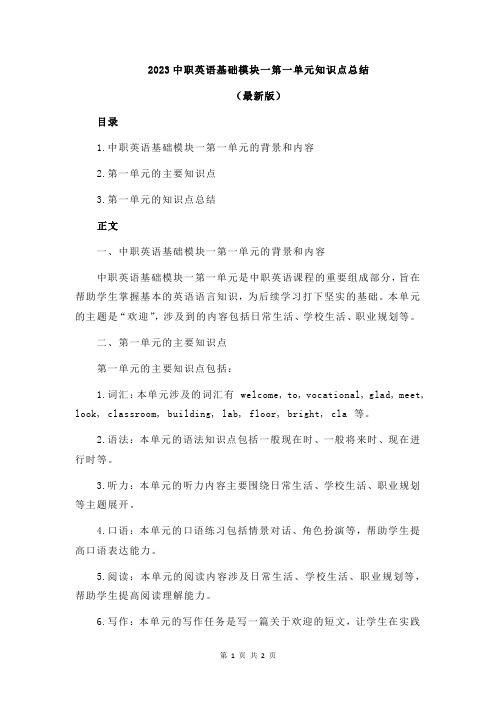
2023中职英语基础模块一第一单元知识点总结
(最新版)
目录
1.中职英语基础模块一第一单元的背景和内容
2.第一单元的主要知识点
3.第一单元的知识点总结
正文
一、中职英语基础模块一第一单元的背景和内容
中职英语基础模块一第一单元是中职英语课程的重要组成部分,旨在
帮助学生掌握基本的英语语言知识,为后续学习打下坚实的基础。
本单元
的主题是“欢迎”,涉及到的内容包括日常生活、学校生活、职业规划等。
二、第一单元的主要知识点
第一单元的主要知识点包括:
1.词汇:本单元涉及的词汇有 welcome, to, vocational, glad, meet, look, classroom, building, lab, floor, bright, cla 等。
2.语法:本单元的语法知识点包括一般现在时、一般将来时、现在进
行时等。
3.听力:本单元的听力内容主要围绕日常生活、学校生活、职业规划
等主题展开。
4.口语:本单元的口语练习包括情景对话、角色扮演等,帮助学生提
高口语表达能力。
5.阅读:本单元的阅读内容涉及日常生活、学校生活、职业规划等,帮助学生提高阅读理解能力。
6.写作:本单元的写作任务是写一篇关于欢迎的短文,让学生在实践
中运用所学知识。
三、第一单元的知识点总结
综上所述,中职英语基础模块一第一单元的知识点涵盖词汇、语法、听力、口语、阅读和写作等多个方面。
学生需要掌握这些知识点,才能更好地理解和运用本单元的内容。
中职英语(语文社2022)基础模块1unit8课文翻译
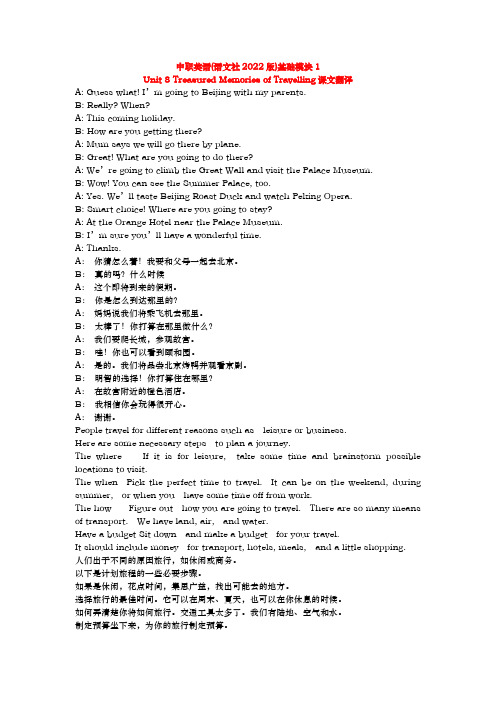
中职英语(语文社2022版)基础模块1Unit 8 Treasured Memories of Travelling课文翻译A: Guess what! I’m going to Beijing with my parents.B: Really? When?A: This coming holiday.B: How are you getting there?A: Mum says we will go there by plane.B: Great! What are you going to do there?A: We’re going to climb the Great Wall and visit the Palace Museum.B: Wow! You can see the Summer Palace, too.A: Yes. We’ll taste Beijing Roast Duck and watch Peking Opera.B: Smart choice! Where are you going to stay?A: At the Orange Hotel near the Palace Museum.B: I’m sure you’ll have a wonderful time.A: Thanks.A:你猜怎么着!我要和父母一起去北京。
B:真的吗?什么时候A:这个即将到来的假期。
B:你是怎么到达那里的?A:妈妈说我们将乘飞机去那里。
B:太棒了!你打算在那里做什么?A:我们要爬长城,参观故宫。
B:哇!你也可以看到颐和园。
A:是的。
我们将品尝北京烤鸭并观看京剧。
B:明智的选择!你打算住在哪里?A:在故宫附近的橙色酒店。
B:我相信你会玩得很开心。
A:谢谢。
People travel for different reasons such as leisure or business.Here are some necessary steps to plan a journey.The where If it is for leisure, take some time and brainstorm possible locations to visit.The when Pick the perfect time to travel. It can be on the weekend, during summer, or when you have some time off from work.The how Figure out how you are going to travel. There are so many means of transport. We have land, air, and water.Have a budget Sit down and make a budget for your travel.It should include money for transport, hotels, meals, and a little shopping.人们出于不同的原因旅行,如休闲或商务。
中职英语新高教版基础模块1unit4school-life
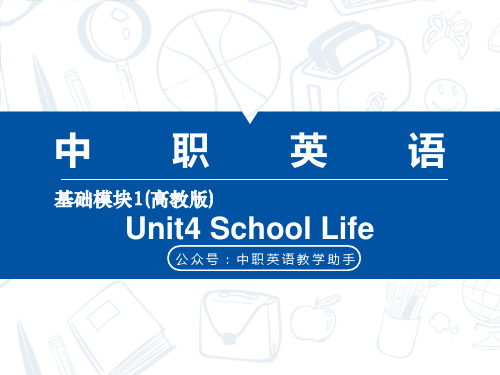
Read and tick.
读以下宣传单,勾选出其目标读者。
Star Vocational High School
Your bright future begins here.
Where do you see yourself in three years? Whether you want to get into a college or to become a skilled worker, Star Vocational High School (SVHS) will prepare you for it.
Learning by Doing . • You will learn and practice your
skills in the training center. • You will also get hands-on
experience by doing internships at real companies.
中职英语
基础模块1(高教版)
Unit4 School Life
公众号:中职英语教学助手
目录
CONTENTS
01 课前热身 02 听说读写 03 文化交流与语法 04 活动与自我评测
Learn and match.
学习以下公共基础课的英文表达,将描述学习感受的形容词与课程相匹配。
Math Chinese
Read and tick. 读以下宣传单,勾选出其目标读者。
• high school teachers • factory workers
√ • middle school students
Read and complete. 再读宣传单,将以下小标题填入对应虚线处。
中职英语基础模块1 UNIT1Unit1(Lesson1)
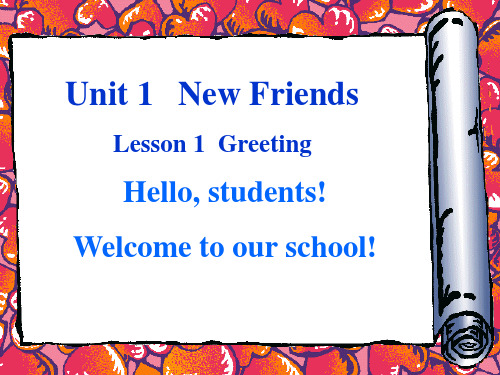
Dialogue B
• 1. Read and underline(问候句)
• 2. repeat the sentences
3.Try to get more sentences(问候)
• Glad to meet you • Nice to meet you • Pleased to meet you • Good to see you
• How do you do ?
4. Practice : ABAB型对话
A: … B: … A: … B: …
Tang Hua
Example
A: Hi! I’m XXX. B: Hi! I’m XXX A: Nice(Glad) to meet you./ How do you do?/
How are you?/ How are things? B: Nice(Glad) to meet you, too./ How do you do?
Unit 1 New Friends
Lesson 1 Greeting
Hello, students! Welcome to our school!
1. The teacher Introduces herself
2. and then asks some students to introduce
Assessment and reflection
1. I can say_____,_______,______,… 2. If I meet Sara Smith,I can say______or
______ 3. If I want to get more information I can
say_____,_______,__________, 4. I can introduce my friend_______________.
中职英语基础模块1 school life
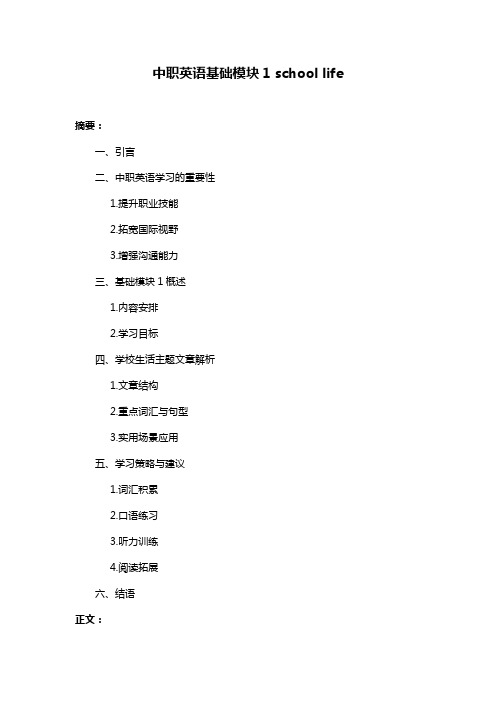
中职英语基础模块1 school life摘要:一、引言二、中职英语学习的重要性1.提升职业技能2.拓宽国际视野3.增强沟通能力三、基础模块1概述1.内容安排2.学习目标四、学校生活主题文章解析1.文章结构2.重点词汇与句型3.实用场景应用五、学习策略与建议1.词汇积累2.口语练习3.听力训练4.阅读拓展六、结语正文:在中职教育阶段,英语学习作为一门基础学科,对于学生的职业技能提升、国际视野拓展以及沟通能力增强具有重要意义。
为此,我们以中职英语基础模块1为依托,探讨学校生活主题,旨在帮助学生更好地理解与应用所学知识。
二、中职英语学习的重要性1.提升职业技能英语作为世界通用语言,在我国经济发展和国际化进程中扮演着举足轻重的角色。
掌握英语,有助于提升中职学生的职业技能,为他们未来的职业生涯打下坚实基础。
2.拓宽国际视野学习英语,可以让学生了解不同文化背景,拓宽国际视野。
这对于未来在全球舞台上施展才华的中职毕业生来说,具有重要意义。
3.增强沟通能力英语沟通能力是中职学生必备的一项技能。
在学习、工作和生活中,良好的英语沟通能力有助于学生更好地与他人交流,增进友谊,提升个人综合素质。
三、基础模块1概述基础模块1是中职英语学习的起点,旨在为学生打下扎实的英语基础。
本模块内容丰富,涵盖学校生活、日常生活、职业场景等多个方面。
通过学习,学生可以掌握一定的英语基本技能,为后续学习奠定基础。
四、学校生活主题文章解析本文以学校生活为主题,分为五个部分:入学、校园环境、课堂活动、课外活动和毕业。
文章通过描述中职学生在学校的生活点滴,展现了他们在学习、交往、成长过程中的喜怒哀乐。
2.重点词汇与句型本文重点词汇包括:入学(enrollment)、校园(campus)、教室(classroom)、课外活动(extracurricular activities)、毕业(graduation)等。
句型方面,文章运用了现在进行时、一般现在时、一般过去时等多种时态,反映了学生在学校生活的不同阶段。
高教社中职英语基础模块1Unit
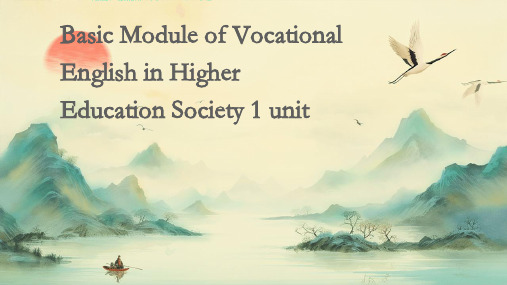
Student feedback and suggestions
Student Feedback
Most students are satisfied with the course content and teaching methods. They appreciate the lively class atmosphere and interactive teaching style.
心。
04
Teaching evaluation
Formative evaluation
目的
及时提供反馈,帮助学生了解 自己的学习状况,调整学习策
略。
方法
观察、口头反馈、作业批改、 小组讨论等。
优点
及时、针对性强,有助于学生 及时纠正错误。
缺点
主观性强,缺乏客观标准,难 以量化评估。
Summative evaluation
02
详细描述
通过阅读职业英语相关文章,提高学生的阅 读理解能力,培养其快速获取信息、分析和 解决问题的能力。
04
详细描述
分析文章的结构、逻辑和写作技巧, 帮助学生了解不同文体的特点,提高 其写作水平。
06
详细描述
通过段落大意的概括练习,培养学生的归纳总 结能力,提高其阅读理解和信息筛选能力。
Listening training
02
Teaching content
Vocabulary learning
在此添加您的文本17字
总结词:掌握基础词汇
在此添加您的文本16字
详细描述:学生应掌握与职业英语相关的常用词汇,包括 专业术语、行业常用表达等,为后续的阅读、写作和交流 打下基础。
中职英语基础模块1 school life

中职英语基础模块1 school life【原创实用版】目录1.中职英语基础模块 1 的重要性2.School Life 单元的内容概述3.具体课程内容与学习目标4.如何有效学习中职英语基础模块 1正文中职英语基础模块 1 是中等职业学校英语课程的基础部分,对于学生掌握基本的英语知识、技能和应用能力有着至关重要的作用。
在这个模块中,学生将学习到各种日常交际用语和基本的英语语法知识,为他们今后的学习和工作奠定坚实的基础。
School Life 单元是中职英语基础模块 1 的一个重要部分,该单元主要围绕学校生活展开,包括问候、介绍、校园生活、时间、食品等方面。
通过这个单元的学习,学生可以掌握如何用英语进行简单的日常交流,了解不同国家的学校生活和文化,培养他们的跨文化交际能力。
具体到课程内容,School Life 单元包括以下几个部分:问候和介绍、校园生活、时间、食品。
在学习问候和介绍部分,学生将学习如何用英语和他人进行问候和自我介绍,以及如何表达对他人的欢迎和祝愿。
在校园生活部分,学生将学习如何用英语描述学校的各种设施和活动,以及如何表达自己在校园生活中的感受和经历。
在时间部分,学生将学习如何用英语表达时间和日期,以及如何用英语询问和安排自己的时间。
在食品部分,学生将学习如何用英语描述各种食物和饮料,以及如何表达自己对食品的喜好和需求。
要有效学习中职英语基础模块 1,首先,学生要认真听讲、积极参与课堂活动,掌握教师教授的各项知识和技能。
其次,学生要在课后进行大量的练习,通过做题、写作、朗读等方式巩固所学知识。
最后,学生要通过实际应用,与他人用英语进行交流,提高自己的英语实际应用能力。
总的来说,中职英语基础模块 1 的学习对于学生的英语学习生涯至关重要,而 School Life 单元的学习则是这个模块的重要组成部分。
中职英语基础模块1 school life
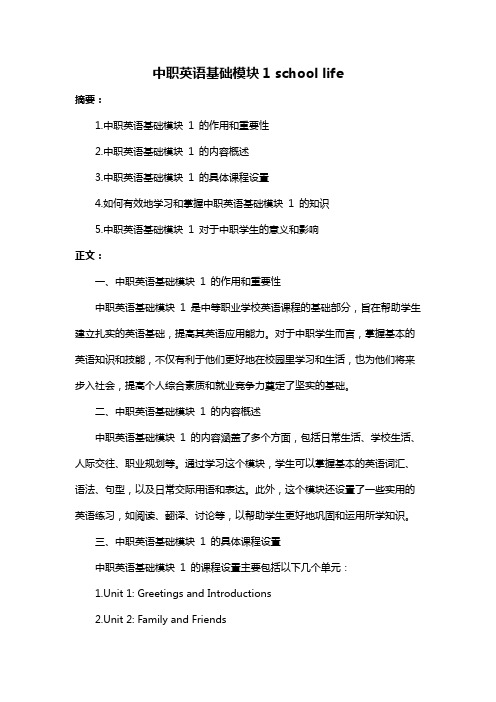
中职英语基础模块1 school life摘要:1.中职英语基础模块1 的作用和重要性2.中职英语基础模块1 的内容概述3.中职英语基础模块1 的具体课程设置4.如何有效地学习和掌握中职英语基础模块1 的知识5.中职英语基础模块1 对于中职学生的意义和影响正文:一、中职英语基础模块1 的作用和重要性中职英语基础模块1 是中等职业学校英语课程的基础部分,旨在帮助学生建立扎实的英语基础,提高其英语应用能力。
对于中职学生而言,掌握基本的英语知识和技能,不仅有利于他们更好地在校园里学习和生活,也为他们将来步入社会,提高个人综合素质和就业竞争力奠定了坚实的基础。
二、中职英语基础模块1 的内容概述中职英语基础模块1 的内容涵盖了多个方面,包括日常生活、学校生活、人际交往、职业规划等。
通过学习这个模块,学生可以掌握基本的英语词汇、语法、句型,以及日常交际用语和表达。
此外,这个模块还设置了一些实用的英语练习,如阅读、翻译、讨论等,以帮助学生更好地巩固和运用所学知识。
三、中职英语基础模块1 的具体课程设置中职英语基础模块1 的课程设置主要包括以下几个单元:1.Unit 1: Greetings and Introductions2.Unit 2: Family and Friends3.Unit 3: School Life4.Unit 4: Time and Daily Routines5.Unit 5: Food and Restaurants每个单元都包含了课文、词汇、语法、练习等内容,形成了一个完整的教学体系。
四、如何有效地学习和掌握中职英语基础模块1 的知识要想有效地学习和掌握中职英语基础模块1 的知识,学生需要做到以下几点:1.认真听课,积极参与课堂活动,不懂就问,及时解决疑惑。
2.课后及时复习,巩固所学知识,特别是词汇和语法。
3.多做练习,提高英语应用能力,尤其是阅读和写作。
4.创造一个良好的英语学习环境,如多与同学进行英语交流,观看英语电影等。
高教版中职英语基础模块一 Unit1 文化理解和小组活动精美课件

Underline important information about Lu Xun’s three different names in this information board.
在以下简介牌中标出有关鲁迅先生三个不同名字的重要信息。
Lu Xun (鲁迅) was born in September, 1881. His grandfather named him Zhou Zhangshou (周樟寿), which means longevity (长寿). In April, 1898, he became a student in Jiangnan Naval Academy (江南水师学堂). His grandfather’s brother, Zhou Jiaosheng (周椒生), named him Zhou Shuren (周树人). The given name means educating the young. In May, 1918, he published A Madman’s Diary (《狂人日记》) under the now famous pen name Lu Xun. It is said that he chose Lu Xun because Lu is his mother’s family name and Xun means being fast.
Review
live with sb/sth
和某人或某物住在一起
love sb/sth very much 非常爱某人/某物
live in + 地点
居住在某地
be strict with sb
对某人严格
cook /make lunch
中职英语基础模块第一册unit

中职英语基础模块第一册unit1. Introduction to UnitThe first unit of the vocational English basic module introduces students to the fundamentals of the English language. This unit serves as a foundation for the subsequent modules, laying the groundwork for essential language skills and knowledge. The unit aims to assist students in developing basic communication skills, understanding grammar structures, expanding vocabulary, and improving listening and reading comprehension abilities.2. Unit ObjectivesThe objectives of this unit are as follows:•To introduce students to basic English grammar structures•To expand students’ vocabulary related to everyday life and common topics•To enhance students’ listening and reading comprehension skills•To develop students’ skills i n basic communication and conversation3. Lesson 1: Greetings and IntroductionsIn the first lesson of Unit 1, students are introduced to common greetings and introductions in English. The lesson focuses on essential phrases and polite expressions used in different social contexts. Students will practice verbal and written exercises, engaging in role plays and dialogues to reinforce vocabulary andexpressions. The aim is to ensure that students are able to confidently greet and introduce themselves in various situations.4. Lesson 2: Numbers and DatesLesson 2 covers numbers and dates in English. Students will learn how to count and pronounce numbers, both cardinal and ordinal, from one to one hundred. Additionally, they will become familiar with different ways of expressing dates, including the day, month, and year format. The lesson includes interactive exercises to reinforce comprehension and practical applications of numbers and dates.5. Lesson 3: Family and RelationshipsIn Lesson 3, students learn vocabulary related to family and relationships in English. They will acquire the vocabulary necessary to describe family members, as well as phrases used to discuss relationships and personal connections. The lesson encourages students to engage in discussions about their own families and relationships, providing practical application of the vocabulary in real-life situations.6. Lesson 4: Daily RoutinesThis lesson focuses on daily routines. Students will learn vocabulary and expressions related to activities in their daily lives. They will practice discussing their daily routines and schedules, as well as forming sentences using appropriate verb tenses. The lesson incorporates various listening exercises and interactive activities to enhance understanding and usage of daily routine vocabulary and phrases.7. Lesson 5: Asking for and Giving DirectionsLesson 5 introduces students to vocabulary and phrases used when asking for and giving directions in English. Students will learn how to ask for and give various types of directions, such as asking for directions to a place or providing directions on a map. They will engage in role plays and practical exercises to reinforce their ability to understand and communicate directions effectively.8. Lesson 6: Time Expressions and AdverbsThe final lesson of this unit covers time expressions and adverbs. Students will learn to express specific times and durations using appropriate vocabulary and adverbial phrases. They will engage in listening exercises and writing tasks to reinforce their understanding and usage of time expressions and adverbs in context.9. ConclusionUnit 1 of the vocational English basic module provides students with a solid foundation in English language skills. By focusing on greetings, introductions, numbers, dates, family, daily routines, directions, and time expressions, students will develop essential communication skills necessary for various real-life situations. The unit aims to build students’ confidence in their ability to understand and use English in a vocational context.。
- 1、下载文档前请自行甄别文档内容的完整性,平台不提供额外的编辑、内容补充、找答案等附加服务。
- 2、"仅部分预览"的文档,不可在线预览部分如存在完整性等问题,可反馈申请退款(可完整预览的文档不适用该条件!)。
- 3、如文档侵犯您的权益,请联系客服反馈,我们会尽快为您处理(人工客服工作时间:9:00-18:30)。
中职英语(基础模块)1生活与文化原文及翻译The Most Common Family Name 最常见的姓氏Smith is the most common family name in the United Kingdom and the United States .More than 3 million p,eople in the United States share this name ,and more than half a million share it in the United Kingdom .史密斯是英国和美国最常见的姓氏。
美国有300多万人分享这个名字,英国有50多万人分享这个名字。
Smith is the name of a job .A smith ( orblacksmith )is a man who works with metal .It is one of the earllest jobs in all countries .As a result ,Smith becomes the most common of all family names .史密斯是一份工作的名字。
铁匠(或铁匠)是一个用金属工作的人。
这是所有国家最早的工作之一。
因此,史密斯成为所有姓氏中最常见的。
The"Magic Word"“魔法词”"Please" is the first and most useful " magic word ".It's the first word taught in homes in the West .During a meal ,a kid may say ,"Mommy !Give me some milk !"The mother quickly responds,"What's the magic word ?"The kid never answers ," Abracadabra."He says,"Please".“请”是第一个也是最有用的“魔法词”。
这是西方家庭教的第一个词。
吃饭的时候,孩子可能会说:“妈妈!给我一些牛奶!”母亲很快回答,“神奇的词是什么?”孩子从不回答,“Abracadabra(魔术师所说的咒语)。
”他说,“请”。
" Please"is the easiest way to make an informal request smooth and kind .Nobody gets upset because the word " please " is used . But many people get angry because it is not used.“请”是使非正式请求顺利和友好的最简单的方法。
没有人会因为使用“请”这个词而生气。
但许多人会生气,因为它没有被使用。
“Black Friday 黑色星期五Black Friday is the Friday after Thanksgiving in the US .It is the beginning of the traditional holiday shopping season .Black Friday used to mean heavy traffic ,but that day ,it means the early opening and late closing of shops .黑色星期五是美国感恩节后的星期五。
是传统节日购物季的开始。
黑色星期五过去意味着繁忙的交通,但那天,它意味着商店的早开放和晚关闭。
On that day ,many people would take the day off to go shopping ,because many things are on sharp discount that day . In many cities ,people line up hours before stores open . Electric appliances,clothes and toys are often the most popular items .Many people buy Christmas gifts for their friends and families ,some others buy items at a very low price and resell them online .在那一天,许多人会请假去购物,因为那天很多东西都打折。
在许多城市,人们在商店开业前几个小时排队。
电器、衣服和玩具往往是最受欢迎的物品。
许多人为他们的朋友和家人购买圣诞礼物,有些人以很低的价格购买物品并在网上转售。
Meeting and Greeting 见面与问候In some countries people greet each other by ssing and embracing.Avoid this in Britain .The way to greet a British person for the first time is to shake hands with him or her.There should be no more than three shakes up and down .Don't pat him or her on the back-this is not British .在一些国家,人们通过唱歌和拥抱互相问候。
在英国不要这样。
第一次问候英国人的方法是与他或她握手。
上下摇动不应超过三次。
不要拍他或她的背-这不是英国人。
Kissing is not common except in the case of elderly ladies .They will incline their heads ,and you should lean towards their left side and kiss the air an inch or so above the cheek .Do not actually TOUCH the cheek with your lips .接吻是不常见的,除了老年妇女。
他们会把头倾斜,你应该靠在他们的左边,亲吻空气在脸颊上方一英寸左右。
实际上不要用你的嘴唇来舔脸颊。
Hobby爱好In the 16th century ,a favorite toy for children of aⅡ ages w as the hobbyhorse.A hobbyhorse could be as simple as a stick ,o r it could have a wooden horse's head on ter ,the hobbyhors e became not very popular ,but the pleasure of doing somethin g outside the routine activites or daily life brought a new word i nto the language .The word"nooby"is the shortened form of ho bbyhorse .在16世纪,所有年龄段的孩子最喜欢的玩具是木马。
木马可以像棍子一样简单,也可以有一匹木头马的头。
后来,木马不太受欢迎,但在日常活动或日常生活之外做一些乐趣的事情,给语言带来了一个新的词。
“noby”一词是业余爱好者的缩写形式。
Hobbies today include many activities .But it does not inclu de spectator activities like watching television .It also excludes s chooling and work done to make a living .今天的爱好包括许多活动。
但它不包括观众活动,如看电视。
它还不包括学校教育和谋生工作。
TheOriginof"Sandwich"“三明治”的由来An English nobleman,the Earl of Sandwich ( 1718-1792),liked gambling.When he gambled he had no time for a meal .But he was hungry for some food .Sok always ordered a waiter to bring him roast-beef between two slices of bread.With the bread ,he wouldn't get his fingers greasy,and he could continue his gambling .Later people named that fast food product sandwich after the Earl.英国贵族,桑威奇伯爵(1718-1792)喜欢赌博。
他赌博时没有时间吃饭。
但他渴望一些食物。
索克总是命令一个侍者把烤牛肉夹在两片面包之间。
有了面包,他不会让手指油腻,他可以继续赌博。
后来人们以伯爵的名字命名了快餐食品三明治。
TheOlympicMotto奥林匹克格言The Olympic motto is made up of three Latin words , " Citius,Altius ,Fortius ",which means " Swifter,Higher , Stronger ".These three words encourage the athletes to do their best during the competition ,and to view this effort as a victory in itself .It can apply equally to athletes and to each one of us . 奥林匹克格言由三个拉丁词组成,即“Citius、Altius、Fortius”,意思是“更快、更高、更强”。
